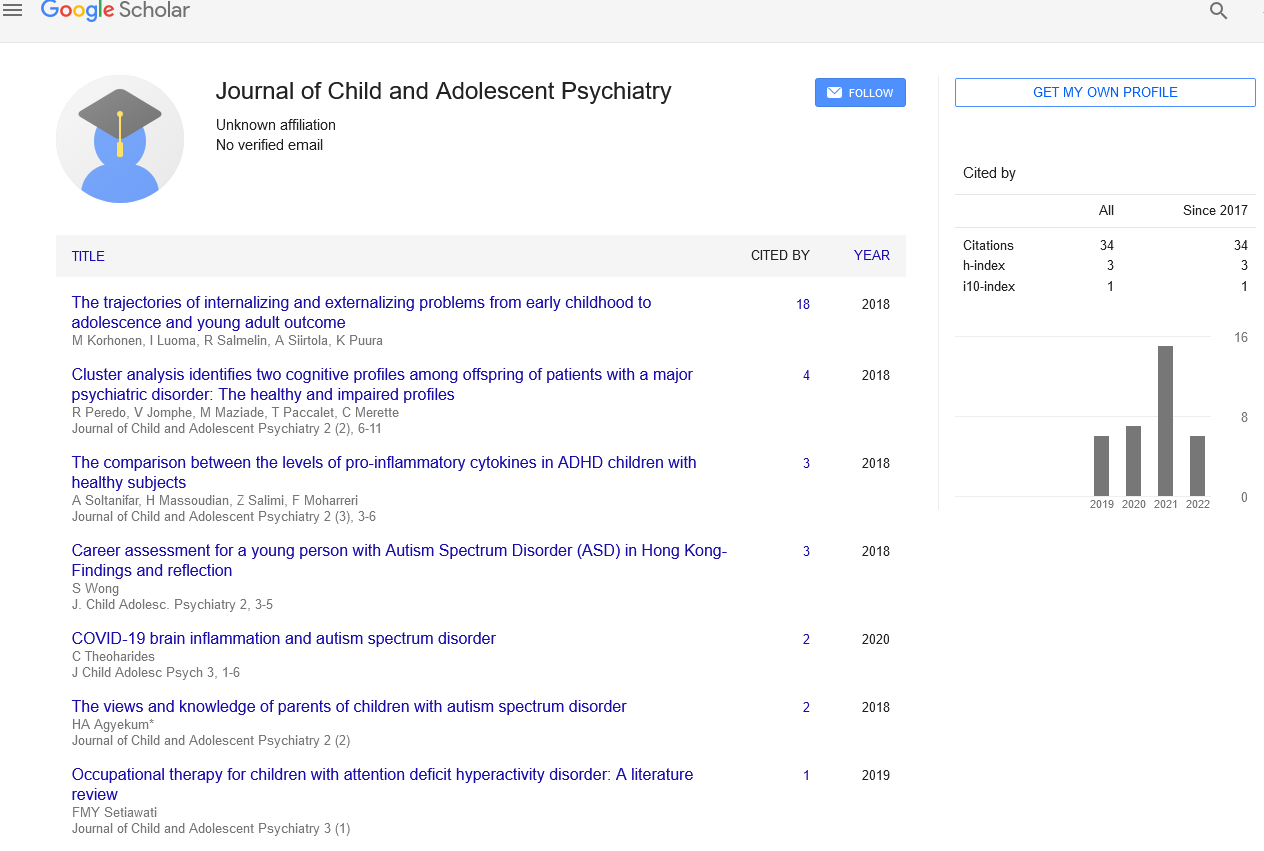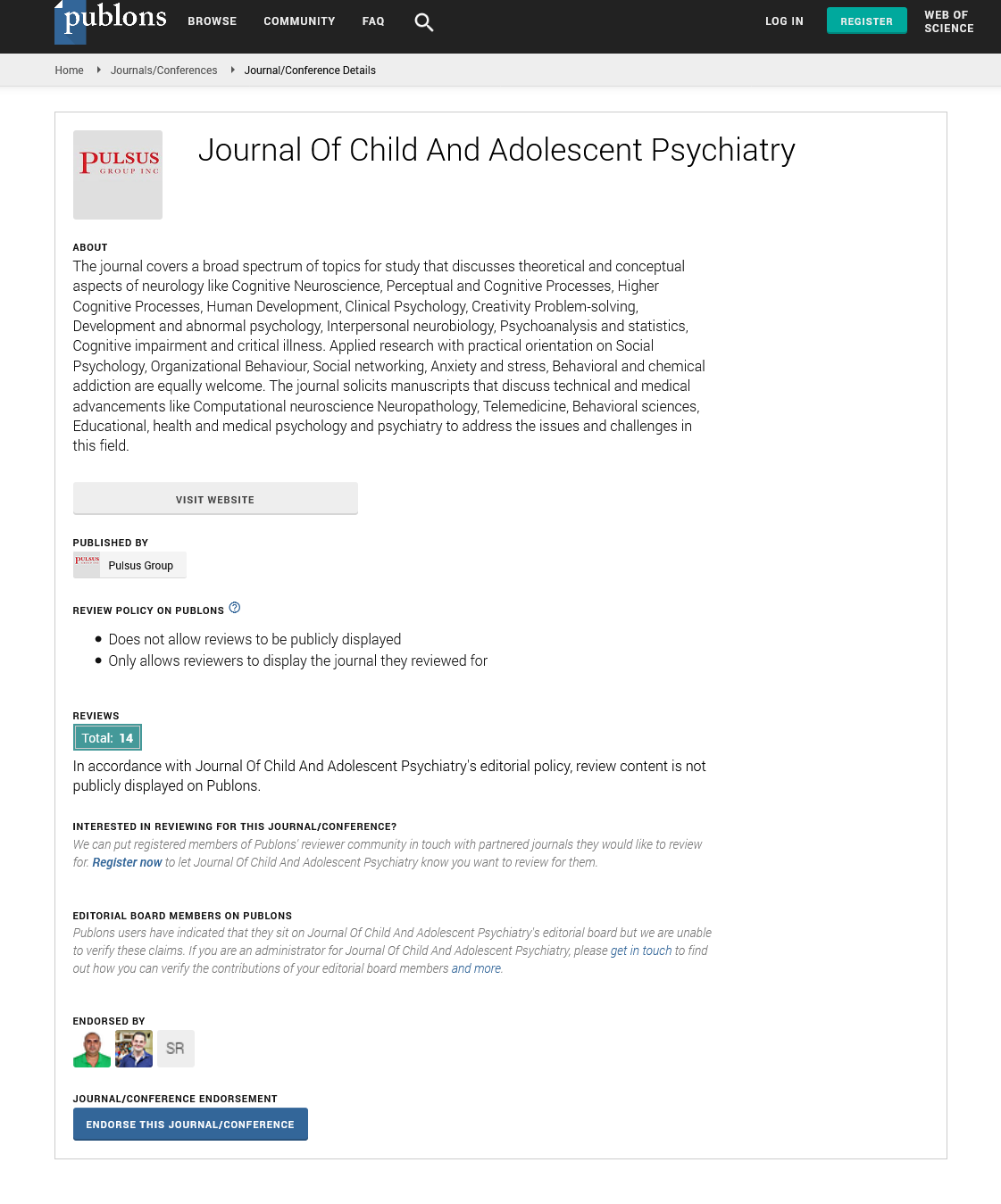Child Developmental Disability: Longitudinal Cognitive-Behavioral Characterization and Novel Interventions
Received: 04-Mar-2023, Manuscript No. puljcap-22-5937; Editor assigned: 12-Mar-2023, Pre QC No. puljcap-22-5937(PQ); Accepted Date: Mar 23, 2023; Reviewed: 16-Mar-2023 QC No. puljcap-22-5937(Q); Revised: 27-Mar-2023, Manuscript No. puljcap-22-5937(R); Published: 30-Mar-2023, DOI: 10.37532/puljcap. 2023.7(1);01-02
Citation: Clemens A. Child developmental disability: Longitudinal cognitive behavioral characterization and novel interventions. J Child Adolescence Psychiatry. 2023; 7(1):01-02.
This open-access article is distributed under the terms of the Creative Commons Attribution Non-Commercial License (CC BY-NC) (http://creativecommons.org/licenses/by-nc/4.0/), which permits reuse, distribution and reproduction of the article, provided that the original work is properly cited and the reuse is restricted to noncommercial purposes. For commercial reuse, contact reprints@pulsus.com
Abstract
For adults with chronic depression, the Cognitive Behavioral Analysis System of Psychotherapy integrates elements of cognitive, behavioral, interpersonal, and psychodynamic therapies. This concept postulates that people with chronic depression feel cut off from their surroundings and hence have less access to critical feedback on unhealthy interpersonal habits and relationships. Patients are actively assisted in developing empathic behavior, recognizing and altering interpersonal depression-related habits, and healing interpersonal trauma through the use of therapeutic relationships. There are three techniques in CBASP.
- Situational analysis is a method of problem-solving intended to assist the patient in understanding the effects of his or her behaviour on others and modifying it.
- Interpersonal discrimination exercises, examine previous traumatic interactions with others and distinguish those from healthier relationships.
- Situational analysis
Key Words
Functional motion disorders; Neurodevelopmental
Introduction
The comprehensive discipline of pediatric psychology examines the cognitive, behavioural, psychological, and motor domains of neurodevelopment in both the typical and atypical population. In fact, the objective of the scientific research presented in this section is to examine the cognitive-behavioral phenotype in the context of neurodevelopment; a secondary goal is to assess the effectiveness of pharmacological and behavioral interventions in fostering adaptive development in children and improving parents' and siblings' quality of life. Considering that paediatric psychology has only been around for a very short time, its clinical and research background is excellent. The field uses a variety of scientific techniques, including occupational therapy, clinical interventions, online training, and naturalistic interventions. Supporting evidence-based therapies in various illnesses is the major goal. Both qualitative and quantitative research methodologies have valuable contributions to the field.
The goal of the research topic is to describe the cognitive-behavioral trajectories and examine the effectiveness of particular interventions for children with developmental disabilities. New pharmaceutical treatments, cognitive-behavioral techniques, psychotherapy, psychological and psycho educational techniques, occupational therapy, and a mix of various approaches are all possible as interventions.
Significant impairments in intellectual functioning and adaptable behaviour, as shown by conceptual, social, and practical adaptive skills, are characteristics of intellectual disability. Before the age of 18, it is diagnosed, but throughout time and with the help of the right treatments, its severity may change. Studies on the effectiveness of organised and personalised therapies are urgently needed since ID has a significant impact on patients and their families and because better results are linked to better quality of life in both children and parents. Work on clinical, cognitive, perceptual, sensory, social, moral, practical, educational, and pharmaceutical treatment in ID both in idiopathic and in hereditary disorders is encouraged. This includes both applied and basic research. Additionally valued are case-series and case-reports that illustrate certain etiologies and cognitive-behavioral phenotypes throughout time.
The goal of this study topic is to further knowledge of cognitivebehavioral phenotypes in the field of neurodevelopment. It also intends to support treatments that enhance the development of adaptable children as well as the mental health of their parents and siblings. Some potential research areas are:
• Profiling/trajectories of neuropsychiatric and cognitive disorders in children with developmental delay.
• interventions in child impairment and developmental delay using neuropsychiatric and neuropsychological methods.
• Early developmental impairment and rehabilitative therapies for children.
• A new, focused pharmaceutical therapy for children with disabilities and developmental delays.
• Parents of children with intellectual disabilities should get psychoeducation on both idiopathic and syndromic illnesses.
• In children, adolescents, and young adults with intellectual disability, occupational and psychological therapy.
• Interventions for children, adolescents, and young adults with intellectual disabilities using cognitive-behavioral techniques.
• Family-centered treatment for children with disabilities
• Therapy for children with disabilities and developmental delays using speech and language.






